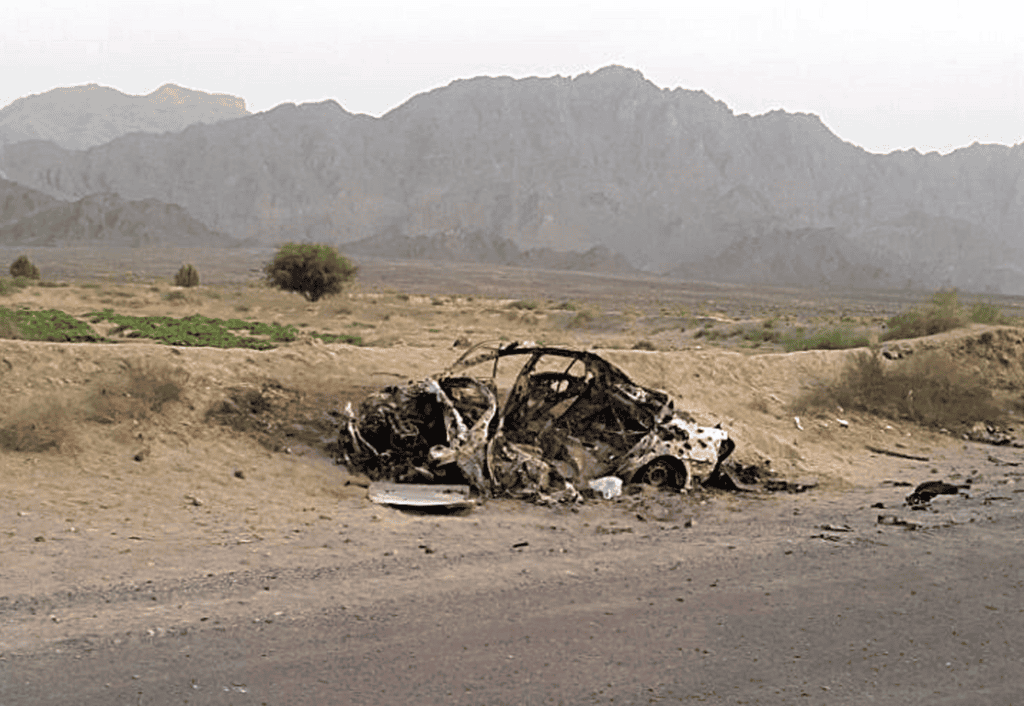
Vehicle said to be carrying Taliban emir Mullah Mansour when he was killed in a drone strike on May 21 in the Pakistani province of Baluchistan. (Associated Press photo)
The White House confirmed the death of Taliban emir Mullah Mansour today, two days after the US said it targeted the group’s leader in an unprecedented airstrike in southwestern Pakistan’s Baluchistan province.
President Obama called Mansour’s death an “important milestone” in a statement from Vietnam, adding that the Taliban should “seize the opportunity” and join peace talks with Afghanistan.
But a likely successor to Mansour, Sirajuddin Haqqani – of the al Qaeda-linked Haqqani Network – is even more unlikely than his predecessor to negotiate a peace agreement.
“Mansour rejected efforts by the Afghan government to seriously engage in peace talks and end the violence that has taken the lives of countless innocent Afghan men, women and children,” President Obama said in the statement. “The Taliban should seize the opportunity to pursue the only real path for ending this long conflict – joining the Afghan government in a reconciliation process that leads to lasting peace and stability.”
President Obama later vowed in a press conference with reporters in Vietnam that the US is “not re-entering the day-to-day combat missions that are currently being conducted by Afghanistan forces.”
“This does not represent a shift in our approach,” President Obama said, according to The Los Angeles Times.
The Taliban has yet to officially confirm Mansour’s death. However the Quetta Shura, the Taliban’s executive decision making council, is said to be meeting to choose his successor. According to Reuters, Siraj Haqqani and Mullah Yacoub, a son of Mullah Omar, are believed to be the front runners to replace Mansour. Mullah Haibatullah Akhundzada, one of Mansour’s two deputies and the Taliban’s top sharia official is also a candidate.
Yesterday, the National Directorate of Intelligence, Afghanistan’s intelligence service, said that it confirmed that Mansour was indeed killed in an airstrike in Baluchistan in Pakistan.
The May 21 drone strike which killed Mansour was the first by the US in the Pakistani province of Baluchistan, where the Taliban’s top leadership had been known to setup shop in Quetta. Previously, the US military almost exclusively limited drone strikes to Pakistan’s tribal agencies. According to data compiled by The Long War Journal, May 21 marked the first of 391 drone strikes conducted outside of North or South Waziristan.
Since Mansour was believed to be operating under the auspices and protection of Pakistan’s Inter-Services Intelligence Directorate, the attack raises questions whether the US was operating in conjunction or on a tip from Pakistani intelligence, or without Pakistani permission. The US has conducted multiple airstrikes against al Qaeda, the Taliban, and a host of allied jihadist groups inside Pakistan, many without the permission of the Pakistani government. The Pakistani government has even issued formal condemnations of airstrikes that have killed senior jihadists via its Ministry of Foreign Affairs.
Pakistan’s Ministry of Foreign Affairs issued a formal statement protesting the strike that targeted Mansour while acknowledging that the US informed Pakistan’s prime minister and top military leader after the attack took place.
“This information was shared with the Prime Minister and the Chief of Army Staff after the drone strike,” according to a statement released by the Ministry of Foreign Affairs.
“Pakistan wishes to once again state that the drone attack was a violation of its sovereignty, an issue which has been raised with the United States in the past as well,” the statement said.








5 Comments
Bruce Reidel has offered valuable insight on this hit. Mansour was 100% an ISI asset. No way the PakMil would have greenlighted his elimination, so no forewarning was given. Moreover, Sharif has no control over the military, according to Reidel so he was completely out of the loop. We have to do our own garbage collection in that hole.
May I suggest once again that we attack the shura, taking place now?
Mansour’s ascension to emir was hotly contested and extremely bloody. He was most likely ratted out by someone who had a score to settle with him.
(in Quetta, Baluchistan)
Correction: Bruce Riedel
Pakistanis are lying and crying as usual. See Sherry Rehman for particularly poignant and pungent verbiage. You are a sponsor and trainer of killers, madame.
Yup. Lots of good info here:
http://www.wsj.com/articles/u-s-tracked-taliban-leader-before-drone-strike-1464109562
Here’s your rat:
U.S. intelligence agencies received information that allowed them to track Mullah Mansour’s movements, including details about devices he used for communications, U.S. officials said.
Siraj? He got a deputy slot to Mullah Unpronouncable..
Siraj was already Mansour’s deputy. He retained the position.